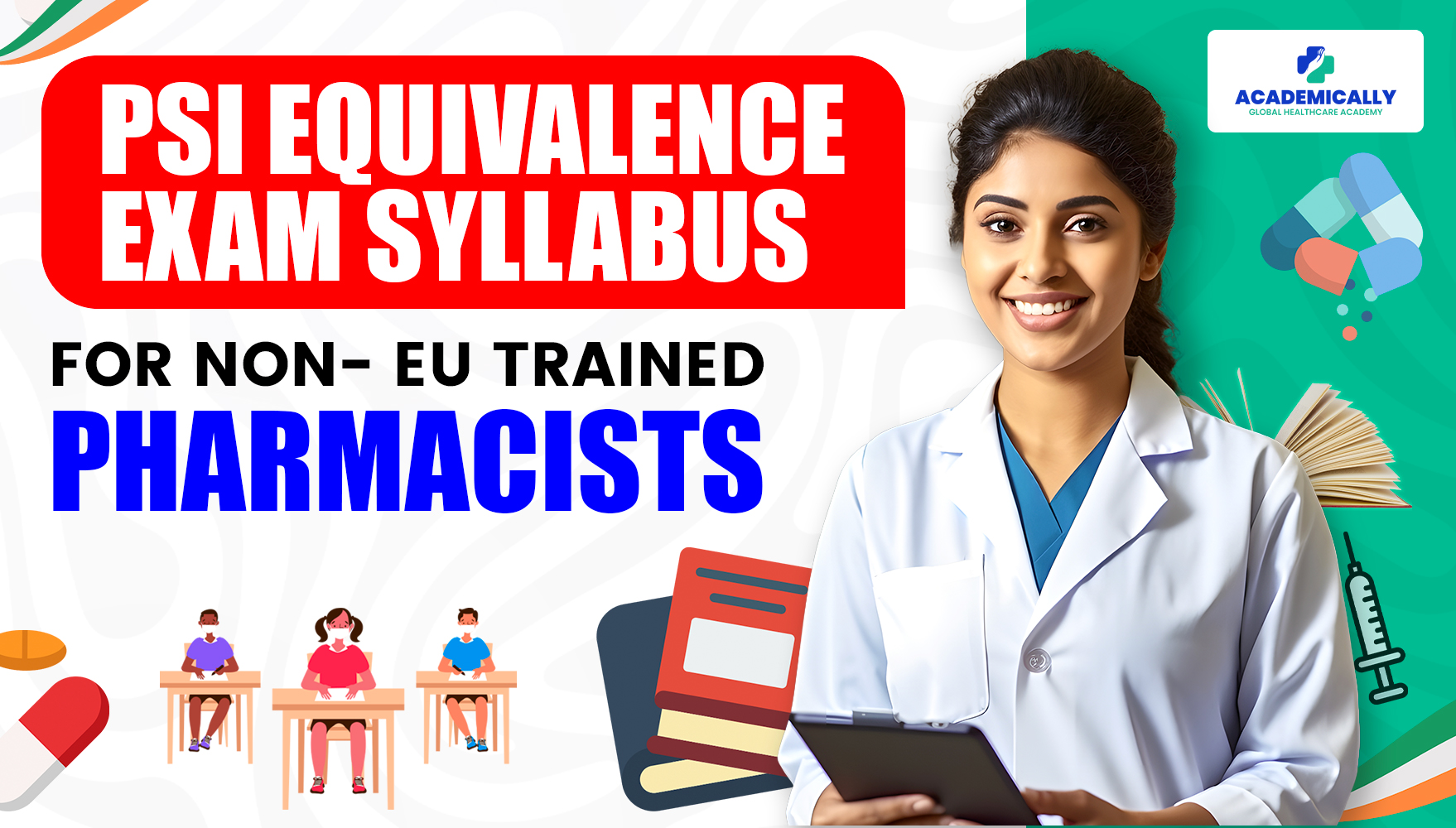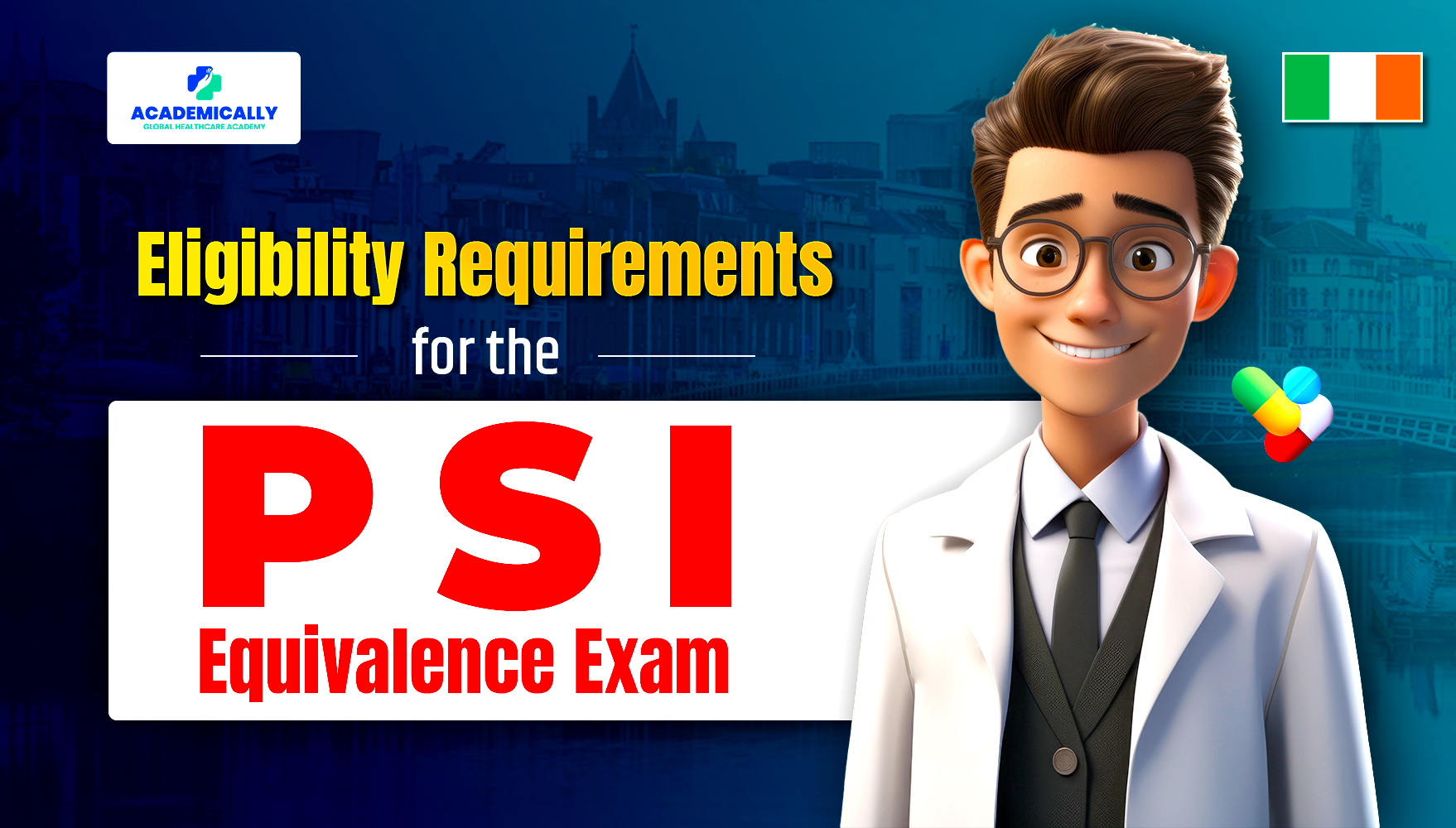Here is the complete list of topics asked in the Pharmaceutical Society of Ireland (PSI) Equivalence Exam
1. Patient- Focused Care
The subject prioritises patients and their needs, emphasising an extensive approach to treatment. It covers biological, environmental, psychological, and social aspects of medication, designed to meet specific patient requirements in Ireland.
- The unique role of the pharmacist in ensuring that the patient benefits from pharmaceutical advice and care
- The ethical obligations of the pharmacist and the duty of care to the patient and the public – placing patients at the centre of what they do.
- Health and illness: definitions and perceptions, health psychology and health Literacy.
- Theory and practice of personal and interpersonal skills, including written and oral communication skills and patient consultation skills.
- Principles and methodologies of the social sciences and psychology relevant to Pharmacy.
- The ideas and approaches of concordance and adherence support in healthcare provision, particularly as they apply to medicines optimisation.
- The pharmacist’s contribution to the promotion of good health and disease prevention.
- Normal and abnormal bodily function: anatomy, physiology, genetics, nutrition, biochemistry, immunology, microbiology, pathology, pathophysiology and infective processes.
- Aetiology and epidemiology of diseases and the principles of their drug treatment.
- Symptoms recognition and management, the principles of differential diagnosis, diagnostic methods and tests, and medical terminology.
- Disease management and pharmaceutical care planning, including application of clinical guidelines, prescribing guidelines, evidence-based decision making and clinical medication review.
- The rationale and evidence–base for complementary therapies.
- Drug and substance misuse, including physiological and psychological dependence.
- Toxicology and adverse effects of medicines and substances of abuse.
2. Health Care Systems & Guidance
In order for pharmacy graduates to practise with proficiency and confidence, they must have comprehensive knowledge, understanding, and should be able to work alongside other health professionals.
- Healthcare systems in Ireland including roles of pharmacists and other health care professionals in primary, secondary and tertiary health care including the role of pharmacists as the/a Qualified Person in the pharmaceutical industry.
- The duty of care to the patient and the wider public: concept, scope and application of healthcare ethics.
- Professional standards and guidelines for practice. The principles of Continuing Professional Development (CPD) as a continual process of lifelong learning which is focused on implementing learning within professional practice and improving outcomes for patients.
- Principles of organisation in the workplace, including procedures and policies, resources requirements, management roles and structures within pharmacy settings.
- Oversight and development of those working in the pharmacy team.
- Communication skills relating to multidisciplinary working and getting the best outcome from medicines for patients.
- The obligations of pharmacists as professionals requiring registration in order to practise including their compliance with statutory codes of conduct.
- Clinical governance: clinical audit and risk management. Quality assurance and improvement. Safety science, including organisation and safety culture, implementation science, managing and learning from errors.
- Evidence-based policy and practice: use of evidence-based knowledge to develop policy and translate into practice.
- Use of information technology in pharmacy and more widely in health care.
- Medicines safety – reporting of errors/critical incidents and systems-based risk minimisation (including root cause analysis).
3. Broader Context
The Pharmacy graduates should understand how healthcare and pharmacy work in the bigger picture. This subject covers all the essentials for the same.
- The political and legal framework, requirements and processes relevant to pharmacy in Ireland and within the EU.
- The role of public health, health promotion, and health economics, particularly pharmaco-economics.
- Scientific, clinical, health services and social services research relevant to pharmacy, translation of evidence into policy and practice.
- Occupational and environmental health and safety and the related legal requirements.
4. Drug Action
- The pharmacy graduate must have a detailed appreciation and understanding of how drugs work and behave.
- Molecular basis of drug action and the actions of drugs within living systems; molecular, cellular, pharmacogenomics, biological and physical aspects.
- Clinical therapeutic uses of drugs and medicines in people including contraindications for, adverse reactions to, and interactions of drugs and their relevance to treatment.
- Drug absorption, distribution, metabolism and excretion and influences thereon, including formulation, route of administration, dosage regimen, age and disease.
- Clinical evaluation of new and existing drugs and medicines, and post-marketing surveillance. Good clinical practice (within clinical trials). Pharmacovigilance.
- Prospects for new approaches in therapeutics.
5. Human & Veterinary Medicines: The Drug Substance
To ensure patient safety and enhance the quality and effectiveness of treatments, it is important that pharmacy graduates understand the sources and properties of drugs, which are the biologically active and therapeutic components of medicines.
- Sources and purification of substances of biotechnological, chemical synthetic, immunological, mineral and plant origin used in medicine.
- Physico-chemical aspects of drugs and biological systems, including thermodynamics and chemical kinetics.
- Specifications of substances used in medicine, including physical and chemical tests.
- Analytical methods: principles, design, development, validation and application.
- Prediction of drug properties, including chemical compatibilities, from molecular Structure.
- Drug design and discovery: principles, approaches and future prospects.
- Cell and molecular biology, including genomics, proteomics and gene therapy, relevant to pharmacy.
- Biological methods of measuring drug activity and biological standards.
- Biotechnology and biotechnological processes, personalised medicines and
- Pharmacogenomics.
6. Drug Substance
Formulating and creating medications by transforming pure drug substances into suitable dosage forms for patient use is an important aspect of pharmaceutical science. To ensure the safety, quality, effectiveness, and cost-efficiency of medical treatments, all pharmacy graduates must have complete knowledge, understanding, and skills in this field.
- Sale, supply, administration and monitoring of medicines,
- Medicines: schedules of medicines and controlled substances; consumer protection, including product liability and professional negligence.
- Materials used in formulations and devices for the delivery of drugs, their biological, chemical and physical properties, and the development and application of standards.
- Biopharmaceutics, developmental pharmaceutics, preformulation and formulation studies; design and standardisation of medicines for administration by different routes and for delivery to specific target sites.
- The influence of manufacture and distribution on product quality with respect to biological safety, bioavailability (including bioequivalence), dosage uniformity and Stability.
- Packaging and labelling: purpose, design and evaluation.
- Quality assurance of pharmaceutical products and processes, including Good Laboratory Practice and Good Manufacturing Practice.
- Microbiological contamination: sources, determination, consequences and control.
- Sterilisation procedures and aseptic procedures in the preparation of pharmaceutical products and medical devices; monitoring of sterilisation processes.
- Environmental control in manufacturing facilities and in the supply chain.
- Degradation of medicines: evaluation and control of biological, chemical and physical degradation.
- Immunological, biotechnological and radiopharmaceutical products.
- Dressings and other wound management products.
- Medical devices: their types, regulation and, particularly, their use for the measurement and maintenance of physiological function or medicine delivery.
- Statutes and regulations related to medicines, poisons and controlled substances.
Conclusion
This detailed syllabus outlines all the subjects asked in the PSI Equivalence Exam. Each topic is important and demands thorough preparation to increase your chances of passing the PSI Equivalence exam on the first attempt. Academically offers a comprehensive preparation course to help you excel in the PSI Equivalence Exam.
Our PSI Equivalence program covers all the required topics and provides personalised one-on-one mentoring for more efficient and in-depth learning. With our expert guidance, you'll confidently sit for the exam. For more information about our course or to book your free counselling session, visit Academically today!




